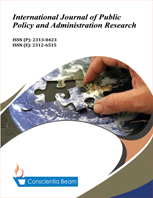Anti-Corruption Crusade in Nigeria: More Words Than Deeds
Abstract
It is generally agreed that corruption is an evil wind that affect everyone and retard societal progress. While there are several theories that explain its prevalence in society, the point to emphasize is that it has become a way of life in Nigeria. This explains why it has been difficult to combat its rising profile. Within the framework of nature of society, neo-patrimonialism, prebendalism, economy of affection, and political god-fatherism theories, an eclectic approach. The paper examines the structural basis of corruption in the country and efforts’ being made by anti-graft agencies to combat the scourge. It is the position of the paper that given the effect of corruption on national development, the fight against corruption is a war that must be won. Therefore, all hands must be on deck to expunge this scourge from the nation's body polity. The first fundamental step among other measures to redress the prevalence of corruption in the polity is to transform the state from an alien force to an entity that caters for the welfare and well-being of the people. Yet, the need for patriotic and visionary leaders that will show the way out in the fight against this common enemy (corruption) through personal example, irrespective of whose ox is gored cannot be overemphasized.

